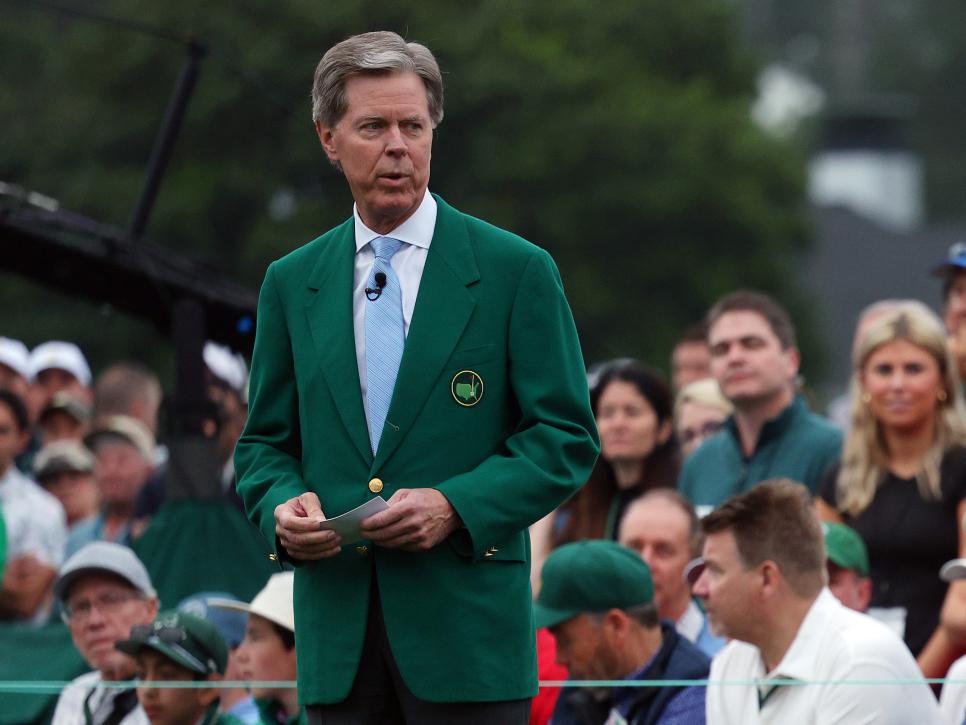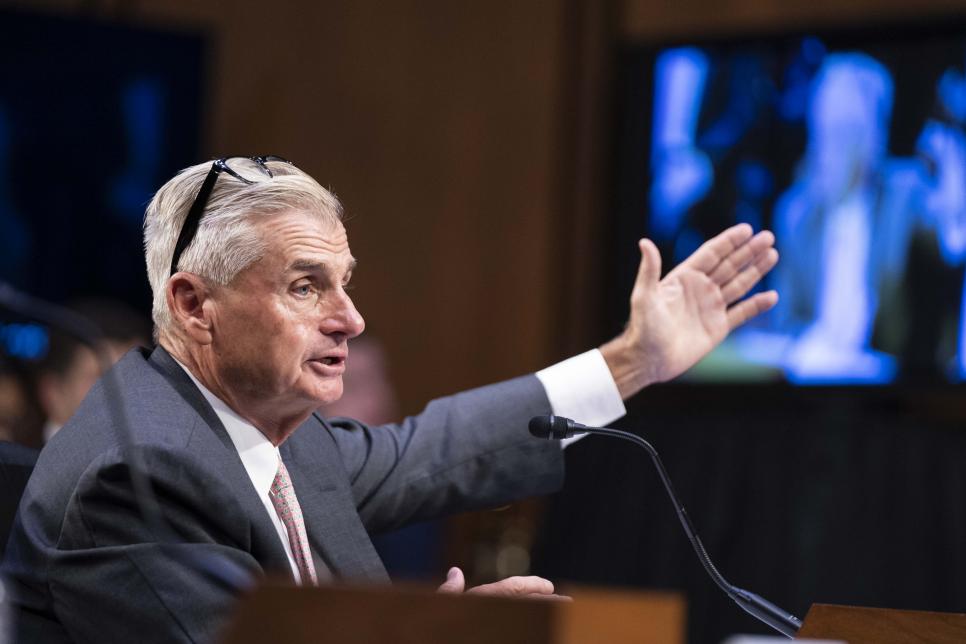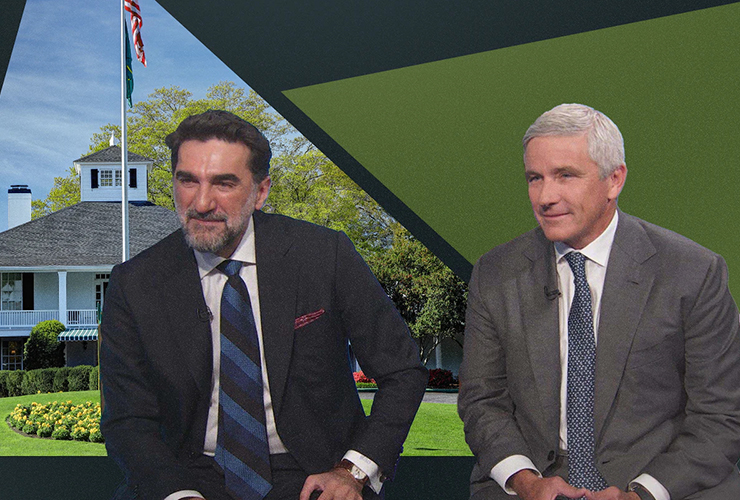Two years after the shocking proposed alliance between the PGA Tour and Saudi Arabia’s Public Investment Fund, a coherent explanation for why bitter adversaries suddenly became bedfellows—and why this seismic arrangement was negotiated in secrecy by an astonishingly small circle of unelected power brokers—remains elusive. In this information vacuum a compelling theory has crystallised among players, agents, business associates and even tour insiders regarding the true catalyst for the deal. Or more accurately, the force behind it.
Augusta National Golf Club is a tradition-bound bastion of influence whose members comprise this country’s corporate, political and financial elite, and whose championship, the Masters, stands as American golf’s most prestigious event, wielding an unparalleled gravitational pull over the sport’s trajectory and future. Augusta National is also notoriously furtive about itself and its actions, operating with a level of privacy comparable to the Pentagon. That’s the thing about outlandish theories: They thrive in precisely the kind of environments that Augusta has meticulously cultivated for generations. These shadows exist where transparency ends and human pattern-seeking begins, connecting dots that may or may not exist but collectively form an irresistible narrative that explains the otherwise inexplicable. Did Augusta National orchestrate the deal with the tour and Saudis?—a perfect storm of mystery, power, and plausible deniability that leaves even skeptics wondering what truly happened.
• • •
Like any formidable mystery, there is a trail of tantalising breadcrumbs. In their explosive opening legal salvo against the PGA Tour, Phil Mickelson, Bryson DeChambeau and nine other LIV Golf defectors alleged in a meticulously documented antitrust lawsuit that Augusta National and Masters chairman Fred Ridley actively collaborated with the tour to arrange a coordinated campaign designed to dissuade players from joining the Saudi-backed circuit. Filed in August 2022, the plaintiffs wrote:
“Augusta National, the promoter of The Masters, has taken multiple actions to indicate its alignment with the PGA Tour, thus seeding doubt among top professional golfers whether they would be banned from future Masters Tournaments. As an initial matter, the links between the PGA Tour and Augusta National run deep. The actions by Augusta National indicate that the PGA Tour has used these channels to pressure Augusta National to do its bidding. For example, in February 2022, Augusta National representatives threatened to disinvite players from The Masters if they joined LIV Golf.”
The complaint further revealed that the PGA Tour urged Augusta National officials to attend a PGA Tour Advisory Council meeting in May 2022, shortly after the formal launch of the LIV Golf Invitational Series. The suit said officials did attend and “they informed the golfers in attendance that the PGA Tour and Augusta National had agreed to work together to address LIV Golf. As described above, the threat of exclusion from the Masters (and the other Majors) is a powerful weapon in the Tour’s arsenal to deter players from joining LIV Golf.”
The claim goes further with this reference to behind-the-scenes actions from Ridley: “In addition, Augusta National Chairman Fred Ridley personally instructed a number of participants in the 2022 Masters not to play in the LIV Golf Invitational Series. Plainly, these threats to top players served no beneficial purpose, as they would only serve to weaken the field in the Masters.” This allegation suggested not merely institutional alignment but direct personal involvement by Ridley (and who he represented) to strangle the fledgling league in its infancy.
Further cementing the pattern of apparent coordination, the plaintiffs noted that Ridley summarily declined a request from LIV Golf CEO Greg Norman to meet and formally discuss the launch of the series and its business model. Perhaps most tellingly, the lawsuit highlights a suspicious temporal connection: Mickelson’s formal suspension from the PGA Tour came the day immediately following the three-time Masters winner’s name being removed from the tournament’s 2022 field.

Fred Ridley has been chairman of Augusta National since 2017. Andrew Redington
Around the same time as the lawsuits, the club became entangled with the Department of Justice—a dimension that adds potential federal implications. In October 2022, multiple outlets reported that the DOJ’s sweeping antitrust investigation into the PGA Tour (entirely separate from the LIV lawsuit) had expanded to include Augusta National, along with the USGA and the PGA of America. These governing bodies, along with the R&A, serve as administrators for the Official World Golf Ranking—the point system that facilitates entry into major championships that was failing to accredit LIV Golf.
Months later, in January 2023, LIV Golf filed accusations against 10 Augusta National members. Most damning were the assertions that former U.S. Secretary of State Condoleezza Rice, an Augusta National member since 2012, had personally attempted to influence the DOJ’s investigation, and that investment banker Warren Stephens, son of a past chairman of Augusta National, was directly asked by tour employees “to push Sen. Tom Cotton, an Arkansas Republican, to lobby against LIV.”
As a necessary caveat, any party can make virtually any claim in legal filings, and a federal judge ultimately denied LIV Golf’s request to expand discovery into these activities. However, the extraordinary specificity of the allegations—naming particular members and identifying specific political figures—created a cloud of suspicion that couldn’t be entirely dismissed by those familiar with Augusta’s vast network of influence. Augusta National, despite its evolving inner dynamics, remains a club that values its privacy with fervor and abhors its workings becoming public spectacle.
Then there is commerce—the inescapable reality of global financial strings that complicates many aspects of golf’s civil war. Many Augusta National members are executives and board chairs of multinational corporations with extensive and lucrative dealings in Saudi Arabia. As individuals, they might publicly bristle at what LIV and the ongoing schism has done to the sport’s traditions and competitive structure. Conversely, they professionally must answer to their businesses, shareholders and boards—creating a potential conflict between golf loyalties and fiduciary responsibilities. Saudi Arabia’s Public Investment Fund may now be under instructions to curtail some of its freelance spending on vanity projects, but its aggressive investing efforts remain in full throttle across global markets; to deliberately antagonise this $700 billion financial juggernaut is to sacrifice access to one of the world’s most significant sources of capital.
Yet, what truly crystallised the belief among insiders that Augusta National was the invisible hand orchestrating a deal was the dealmakers themselves: Jimmy Dunne and Ed Herlihy—both Augusta National members with deep ties to professional golf’s inner sanctum.
Unlike most Augusta National members who guard their affiliation discreetly, Dunne stands as an exception—an outgoing raconteur whose relationships with PGA Tour players have elevated him to celebrity status in golf circles. Beyond the game, Dunne serves as vice chairman and senior managing principal of Piper Sandler, a prominent investment bank and financial services firm specialising in merger advisory. In fall 2022, he joined the PGA Tour as an independent director. Crucially, Dunne’s initial meeting with PIF governor Yasir Al-Rumayyan in spring 2023 laid the groundwork for the framework agreement negotiations.
Though less visible publicly, Herlihy wields comparable influence. Recognised as one of America’s premier acquisition attorneys, he notably orchestrated Bank of America’s $44 billion purchase of Merrill Lynch during the 2008 financial crisis. Like Dunne, Herlihy served on the tour’s policy board as an independent director while simultaneously holding Augusta National membership.
The exclusive invitation into the PIF negotiations to Dunne and Herlihy by PGA Tour commissioner Jay Monahan—while keeping key tour executives in complete darkness until days before the public announcement—demands scrutiny. When congressional hearings in July 2023 forced Dunne to justify this extraordinary secrecy, he offered only the vague explanation that discussions were “fragile.” Senator Richard Blumenthal pointedly challenged this justification: “Most executives and CEOs are legally and morally obligated to keep boards of directors informed.” More troubling still were Dunne’s post-agreement interviews with the Associated Press, USA Today, Golf Channel and Sports Illustrated that produced glaringly inconsistent accounts of why, precisely, this was all happening.
Dunne’s decision to engage with Saudi PIF is particularly interesting.
So, did Dunne and Herlihy author the PIF deal primarily to shield Augusta National from unwanted publicity and prevent further exposure of its private operations? This theory gained such momentum that, according to two sources with direct knowledge, a prominent player confronted PGA Tour leadership in fall 2023, demanding answers about Dunne and Herlihy’s true motivations.
Yet this illustrates the problem with fringe theories. Despite their seductive simplicity, they collapse under serious examination.
• • •

Jimmy Dunne speaks during a Senate Homeland Security and Governmental Affairs Subcommittee hearing in July 2023. Bloomberg
Monahan, Dunne and Herlihy orchestrated the June 6, 2023 Saudi Arabia deal because they realised what others had not—the PGA Tour was bleeding out. Golf’s civil war with LIV Golf had become financially unsustainable for several critical reasons:
- The PGA Tour spent more than $150 million on increased purses, expanded bonuses, and legal battles.
- Despite public claims of stability through 2027, Congressional testimony revealed the PGA Tour was “on fire” from LIV’s spending power.
- Legal expenses alone were projected to exceed an additional $50 million in 2023.
Though early legal proceedings favoured the PGA Tour, the tour’s legal team harbored concerns about their own discovery vulnerabilities—recognising that even the most unassailable legal positions can crumble in the unpredictable environment of a full trial.
The deal’s most strategic element was often overlooked: Within just 10 days, all pending litigation would be permanently dismissed, eliminating both discovery risks and mounting legal costs. These explanations, while lacking dramatic intrigue, align in their straightforward plausibility and represent the unvarnished truth. (Although it perhaps raises the question why the tour would engage in an arms race it had no realistic chance of winning in the first place.)
The accusations against Augusta National likewise misread the club’s operational ethos. Augusta National navigates with greater subtlety and strategic sophistication than such an easily traceable intervention would reflect. Look no further than the club’s land acquisition methodology. The precise scope of Augusta’s property holdings and associated financial investments remains deliberately obscured, as the club shields these transactions behind a network of limited-liability companies rather than conducting business under its own name.
The visibility of Dunne and Herlihy’s involvement actually undermines the theory of Augusta National’s orchestration—a contradiction to the club’s established pattern of discreet maneuvering. Furthermore, sources with direct knowledge of the DOJ’s investigation maintain that the inquiry was primarily procedural in nature, despite its public portrayal, and categorically dismissed LIV’s allegations against Rice and Stephens as entirely without merit.
In fact, those familiar with Augusta National’s inner workings assert that Dunne became a scapegoat. The secretive nature of the initial PIF negotiations triggered backlash against him from tour membership. Dunne received no role on the tour’s transaction team handling future PIF discussions, and when the tour created a new player position specifically for Tiger Woods—following a player petition demanding improved governance and transparency after the June 6 announcement—Dunne’s influence within the tour structure diminished substantially.
He also suffered considerable public relations damage due to his current Saudi Arabian business dealings. Augusta National members—many staunch Dunne supporters—contend tour leadership failed to defend him during the player revolt despite Dunne saving the tour. “Jimmy didn’t need that,” laments one industry insider who considers himself Dunne’s friend, referring to Dunne’s deal-broker role. “He went from the most popular guy in golf to being exiled.”
While exiled might seem hyperbolic for someone who maintains memberships at Augusta National, Pine Valley, Seminole and National Golf Links—and who played in this year’s AT&T Pebble Beach Pro-Am—Dunne undeniably felt the repercussions. He publicly resigned from the tour Policy Board in 2024, pointedly declaring “my role is utterly superfluous.”
Augusta National’s mere consideration as a potential powerbroker in these events speaks to its formidable reputation, though even this substantially overestimates its actual influence. It is, after all, a club that runs one major tournament.
Ironically, some members contend the schism ultimately benefited the Masters, further elevating its already prestigious position as one of just four events where the entire professional golf world competes on a single stage. Augusta National did, however, play a minor role in the peace negotiations, as revealed in documents released during Congressional hearings. Among PIF’s formal requests was Augusta National membership for Al-Rumayyan himself.
As improbable as this demand appears, it represents the most credible element of the entire tale.









